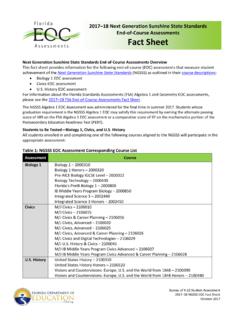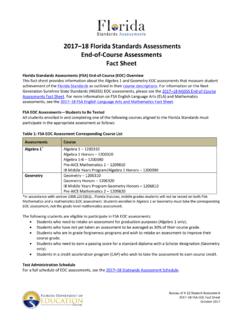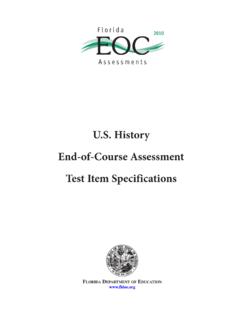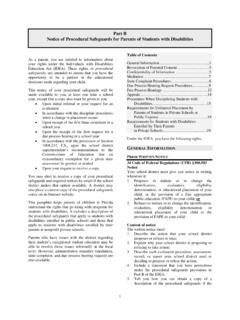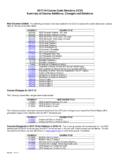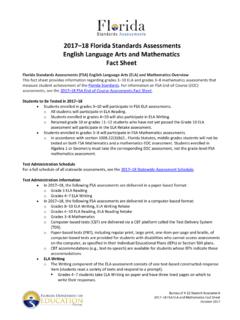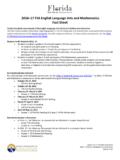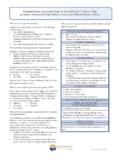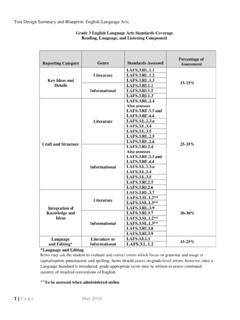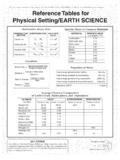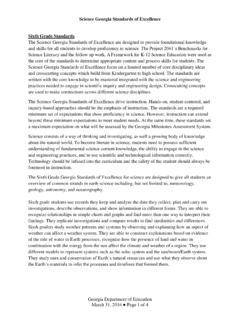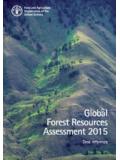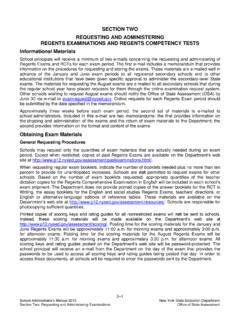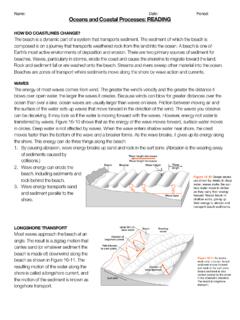Transcription of Grade 5 Suggested Labs and Activities
1 1 Grade 5 suggested labs and activities to Support Science Education The Practice of Science Experiment or Investigation? Students will explain how experiments and other kinds of investigations, such as building a model, observing things in the natural world, or researching a science topic are different. : Explain the difference between an experiment and other types of scientific investigation. Investigating Variables In this inquiry lesson, students will design an experiment to answer the question "How do different surfaces affect the bounce of a ping pong ball?" Students will collect and analyze data as well as identify controls and variables in a scientific experiment. : Define a problem, use appropriate reference materials to support scientific understanding, plan and carry out scientific investigations of various types such as: systematic observations, experiments requiring the identification of variables, collecting and organizing data, interpreting data in charts, tables, and graphics, analyze information, make predictions, and defend conclusions.
2 : Recognize and explain the need for repeated experimental trials. : Identify a control group and explain its importance in an experiment. Demonstrating How to Conduct a Controlled Investigation Using Sound The teacher conducts an investigation to compare the sound 2 produced by two different sized pipes (higher pitch, lower pitch, louder, softer). The teacher conducts the experiment multiple times, each time changing different variables. The students are "directors" and are asked to "cut" the scene when they observe something wrong with the experiment. : Recognize and explain that scientists base their explanations on evidence. : Attempt reasonable answers to scientific questions and cite evidence in support. : Recognize and explain that science is grounded in empirical observations that are testable; explanation must always be linked with evidence.
3 Introducing the Process of Investigative Science Students are introduced to the process of investigative science through a guided inquiry activity. Given a testable question and materials, students as a class make predictions, and design an investigation with guidance from the teacher. Then in pairs, students do the investigation, collect data, draw conclusions, and discuss ways to improve on the investigative design. After this activity, students will be able to develop independent investigations in this and other subject areas. : Define a problem, use appropriate reference materials to support scientific understanding, plan and carry out scientific investigations of various types such as: systematic observations, experiments requiring the identification of variables, collecting and organizing data, interpreting data in charts, tables, and graphics, analyze information, make predictions, and defend conclusions.
4 : Recognize and explain the difference between 3 personal opinion/interpretation and verified observation. : Recognize and explain that science is grounded in empirical observations that are testable; explanation must always be linked with evidence. : Recognize and explain that when scientific investigations are carried out, the evidence produced by those investigations should be replicable by others. Earth/ Space Science Cycling Water Through the Environment Water plays a major role in the planet's weather and climate, as well as nourishes people, plants, and animals; it is a crucial ingredient for life on Earth. Earth's natural mechanism for transporting, cleansing, and recycling water between the surface and the atmosphere is referred to as the water cycle. This lesson has students recognize water's different forms and where it exists in the environment.
5 The class will discuss and perform experiments, modeling the water cycle and exploring how salt water can be distilled into fresh water. : Create a model to explain the parts of the water cycle. Water can be a gas, a liquid, or a solid and can go back and forth from one state to another : Recognize that the ocean is an integral part of the water cycle and is connected to all of Earth's water reservoirs via evaporation and precipitation processes. 4 Weather and Pressure Systems Approaching weather systems are generally associated with atmospheric pressure. This 45 minute lesson is designed to help your students understand what type of weather is associated with low-pressure systems and high-pressure systems. : Recognize how air temperature, barometric pressure, humidity, wind speed and direction, and precipitation determine the weather in a particular place and time.
6 Galaxies and Solar Systems The students will learn all about outer space in this lesson. They will make a model of a galaxy and learn the vocabulary that relates to this topic. The students will also learn how to classify a planet and describe its features. They will be taught about the Earth's position in the solar system as well as that of the other planets in our solar system. The students will also learn how to classify between the different objects that are in our solar system. : Explain the difference between an experiment and other types of scientific investigation. : Recognize and explain that science is grounded in empirical observations that are testable; explanation must always be linked with evidence. : Recognize that a galaxy consists of gas, dust, and many stars, including any objects orbiting the stars.
7 Identify our home galaxy as the Milky Way. : Recognize the major common characteristics of all planets and compare/contrast the properties of inner and outer planets. : Distinguish among the following objects of the Solar System -- Sun, planets, moons, asteroids, comets -- and identify 5 Earth's position in it. Life Science Name that Organ Can you name that organ with one clue? What about two? Students will get the opportunity to research organs and create clue cards with at least four clues that will help others Name That Organ! : Identify the organs in the human body and describe their functions, including the skin, brain, heart, lungs, stomach, liver, intestines, pancreas, muscles and skeleton, reproductive organs, kidneys, bladder, and sensory organs. Survival of the Fittest This is a five day lesson integrating Science, Reading and Writing.
8 It is developed on a Reading lesson plan format using Shared Reading, Core Reading, Guided Reading and centers but can easily be transferred on to a Science 5E lesson format. The versatility of the lesson and the integration between subjects lends itself to it being widely used among teachers for different reasons; whether the teacher's need be in Science, Reading or Writing the lesson provides opportunities for all areas to be addressed. Most importantly, it offers the busy teacher an opportunity to implement one lesson to cover three subjects. : Recognize and explain the need for repeated experimental trials. : Describe how, when the environment changes, differences between individuals allow some plants and animals to survive and reproduce while others die or move to new locations. 6 Exploring Habitats If you could live anywhere in the world, where would you live?
9 Do you think you could survive anywhere in the world or in any habitat? What types of adaptations might help you survive in your dream habitat? Many places seem great to visit, but you won't know if it's the place for you unless you know the characteristics of the habitat. This lesson will encourage your students to research habitats and adaptations that allow plants and animals to survive in their natural environments. : Compare and contrast adaptations displayed by animals and plants that enable them to survive in different environments such as life cycles variations, animal behaviors and physical characteristics. Physical Science Separating Solid Mixture Have you ever considered that toys in a toy box are a mixture? In this lesson, students will explore how to separate solid mixtures based on observable properties such as particle color, shape, size, and magnetic attraction.
10 : Demonstrate and explain that mixtures of solids can be separated based on observable properties of their parts such as particle size, shape, color, and magnetic attraction. Investigate Dissolving Investigate Dissolving Lab Sheet (PDF) Investigate Dissolving Procedure (PDF) : Define a problem, use appropriate reference 7 materials to support scientific understanding, plan and carry out scientific investigations of various types such as: systematic observations, experiments requiring the identification of variables, collecting and organizing data, interpreting data in charts, tables, and graphics, analyze information, make predictions, and defend conclusions. : Investigate and identify materials that will dissolve in water and those that will not and identify the conditions that will speed up or slow down the dissolving process.
